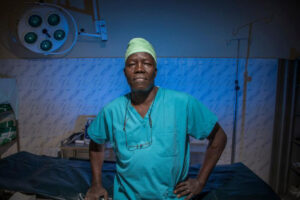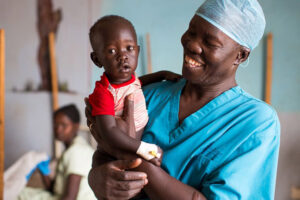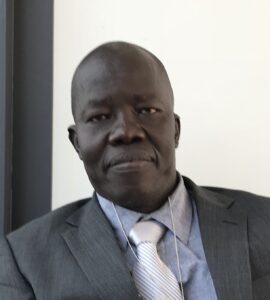Evan Atar Adaha
Credentials
Humanitarian Cause
Healthcare and Food Security, Emergency Response, Provision of Medical Services, Emergency Healthcare
Impact Location
South Sudan
Occupation
Medical Professional / Founder of Maban Referral Hospital
Photo Gallery
About
Dr. Evan Atar Adaha, a distinguished South Sudanese surgeon and humanitarian, exemplifies resilience and leadership in one of the world’s most challenging environments. He is the medical director and chief surgeon of Maban Referral Hospital, the only surgical facility serving the conflict-ridden region of Maban County in South Sudan. Dr. Atar’s unwavering dedication to providing life-saving medical care to some of the most vulnerable populations, including refugees and victims of ongoing conflict, has earned him international recognition, notably the prestigious 2018 UNHCR Nansen Refugee Award.
Dr. Atar was born in the village of Hiyala, South Sudan, where his mother, determined to prevent him from the plight of illiteracy, sent him to Juba at the age of seven for his primary education. Her decision stemmed from personal experiences of hardship caused by illiteracy in their community. At an age when he was expected to tend to his late father’s livestock, Dr. Atar instead pursued education with unyielding determination.
In 1989, Dr. Atar received a scholarship from the Egyptian government to study medicine at Mansoura University. After graduating in 1996, he encountered financial obstacles during his mandatory internship, but his hard work and dedication prompted the university to waive his fees. During his time at Victoria Hospital in Alexandria, he began his humanitarian work, reducing the cost of deliveries for Sudanese women and assisting them with essential maternal health services.
In 1997, as conflict in Sudan intensified, Dr. Atar was approached by the Sudan Relief and Rehabilitation Association (SRRA) to provide medical aid in war-torn Southern Blue Nile. Despite warnings of the immense risk, Dr. Atar accepted, driven by his unwavering belief in his calling as a doctor.
“The news of me going there spread quicker than I expected, and the women’s group I had been helping came and requested me not to go, telling me it was highly risky, and I may be killed in the mission. My answer to this warning was that my life is in the hands of God, not in my hands.”
Upon arriving at the hospital in Kurmuk, he faced overwhelming challenges—no medical supplies, no staff, and a dilapidated building. Undeterred, he mobilized local volunteers to clean the hospital and began training local youth as nurse assistants, establishing a team to serve the wounded.
In 1998, Dr. Atar faced his first major test when war casualties flooded the hospital. Without proper equipment, he improvised, using hollow stems as chest tubes and tree bark for splints. His resourcefulness and dedication saved lives in dire circumstances. Over time, with the help of visiting humanitarian organizations, including Médecins Sans Frontières (MSF) and Baroness Caroline Cox, Dr. Atar secured critical supplies, allowing the hospital to function as a proper medical facility.
In 2005, after the Comprehensive Peace Agreement, Dr. Atar received support from the government, but peace was short-lived. In 2011, under intense bombardment by Sudanese forces, he made the dangerous decision to relocate his hospital across the border into South Sudan’s Maban County. It was a harrowing month-long journey through flooded terrain, but it marked the beginning of a new chapter in his medical service. Arriving in Maban, he found only a primary health-care center with no functioning surgical facilities. Determined to provide comprehensive care to the area’s displaced population, Dr. Atar led the transformation of this modest health center into the current Maban Referral Hospital, a facility with 120 beds and two operating theaters that now handles an average of 58 surgeries per week.
“The problems we faced were big. The number of refugees went up fast and reached 200,000 people. We were able to operate with no surgical theatre, but we had to improvise most of the equipment to save lives.”
Despite these advancements, conditions at Maban Referral Hospital remain extremely challenging. The hospital operates with limited supplies and outdated equipment, yet it remains a crucial lifeline for the local population and thousands of refugees from Sudan’s Blue Nile and South Kordofan regions. Dr. Atar’s resourcefulness in this setting is legendary. When he first arrived, he had to perform surgeries on a makeshift table constructed from stacked doors. Today, although the hospital has grown, the team still faces significant challenges, including a lack of general anesthesia and the absence of a functioning x-ray machine. To carry out operations, Dr. Atar and his team rely on ketamine injections and spinal epidurals, adapting their techniques to the available resources.
Dr. Atar’s approach to leadership is deeply hands-on, and his commitment to his team and patients goes far beyond the traditional role of a surgeon. Whether he is performing surgeries, assisting nurses, or tending to patients in the neonatal ward, Dr. Atar leads by example. His humility and willingness to take on any task, no matter how menial, are indicative of his profound sense of responsibility. One vivid example of his ingenuity occurred when he was found standing atop the hospital’s operating table, repairing an overhead light, a scene that encapsulates his refusal to let inadequate infrastructure stand in the way of patient care.
“Healing is not the medicine alone. You have to assure the patient. The moment you relate to a patient, they will open their heart to you.”
Fluent in Arabic, Dr. Atar often prays with his patients, providing spiritual solace in addition to medical treatment. His unrelenting optimism and commitment to service are driven by his core belief that healthcare is a human right. Despite the enormous personal and professional sacrifices his work demands, Dr. Atar remains grounded and focused on his mission. His family resides in Nairobi, far from the war-torn region where he lives and works. Dr. Atar only sees them three times a year during short breaks from his duties, yet he stays connected through technology, even assisting his children with their homework during his brief moments of rest. His life, in many ways, revolves around the hospital, where he lives in a weathered canvas tent on the hospital grounds.
In 2018, Dr. Atar’s tireless work was recognized on the global stage when he received the UNHCR Nansen Refugee Award. This prestigious honor is a testament to his more than two decades of service to displaced populations, yet Dr. Atar is quick to downplay the personal significance of such accolades. For him, the recognition is a reflection of the teamwork and collaboration that make the hospital’s success possible. He attributes much of the hospital’s accomplishments to the dedication of his colleagues, many of whom work long hours under incredibly difficult conditions.
“With the cycle of many wars, it brings unprecedented suffering to innocent people everywhere. The war in Sudan has already been pronounced a forgotten war. We talk of a forgotten war—was it even recognized? It was not at all. The help has been trickling, but the suffering of the people continues to mount on vulnerable populations.”
For the people of Maban County and the thousands of refugees who have come under his care, Dr. Evan Atar Adaha is not just a doctor—he is a lifeline in the truest sense of the word. His relentless dedication to providing healthcare in the face of seemingly insurmountable obstacles will continue to inspire generations of medical professionals and humanitarians alike.
The information on this page was last updated on 10/17/2024 and was provided by the Luminary.




